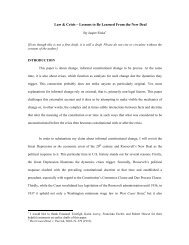In Search of an Enforceable Medical Malpractice Exculpatory
In Search of an Enforceable Medical Malpractice Exculpatory
In Search of an Enforceable Medical Malpractice Exculpatory
You also want an ePaper? Increase the reach of your titles
YUMPU automatically turns print PDFs into web optimized ePapers that Google loves.
872 NEW YORK UNIVERSITY LAW REVIEW [Vol. 84:850<br />
3. Fairness Costs in <strong>Malpractice</strong><br />
If, as discussed above, patients are fairness-regarding with their<br />
medical providers, the question then becomes: Would a patient, by<br />
declining to sign <strong>an</strong> exculpatory agreement <strong>an</strong>d thereby signaling a<br />
lack <strong>of</strong> confidence in her doctor’s competence <strong>an</strong>d a willingness to<br />
sue, be departing from <strong>an</strong> ideal norm? 88 Given that there are no<br />
examples <strong>of</strong> a patient being presented with a nonadhesive exculpatory<br />
agreement (those in reported cases are uniformly adhesive), the question<br />
is difficult to <strong>an</strong>swer empirically.<br />
However, there is evidence that a fairness-regarding patient<br />
would seek to avoid signaling distrustfulness <strong>of</strong> her doctor <strong>an</strong>d a willingness<br />
to sue. First, it is no secret that malpractice suits are a sensitive<br />
subject among doctors, 89 <strong>an</strong>d some doctors might even retaliate<br />
against patients they view as litigious by refusing to treat them or by<br />
practicing “defensive medicine.” 90 Second, it is well documented that<br />
doctors have psychological difficulties with the prospect <strong>of</strong> error, 91<br />
<strong>an</strong>d it is quite plausible that patients are aware <strong>of</strong> this. Third, studies<br />
show that patients sue their doctors very rarely, even when they have<br />
a valid cause <strong>of</strong> action. 92 Moreover, the rate <strong>of</strong> malpractice suits<br />
declines even further if doctors simply apologize to their patients after<br />
making mistakes. 93 Superior evidence <strong>of</strong> fairness-regarding behavior<br />
in the real world would be difficult to find absent <strong>an</strong> empirical study.<br />
Thus, it seems likely that for m<strong>an</strong>y patients, the signaling effect associated<br />
with refusing to sign <strong>an</strong> exculpatory agreement would impose a<br />
88 This question derives from the definition <strong>of</strong> fairness presented in note 76 <strong>an</strong>d accomp<strong>an</strong>ying<br />
text, supra.<br />
89 See, e.g, David Hilfiker, Facing Our Mistakes, 310 N. ENG. J. MED. 118, 121–22<br />
(1984) (“Even the word ‘malpractice’ carries the implication that one has done something<br />
more th<strong>an</strong> make a natural mistake; it connotes guilt <strong>an</strong>d sinfulness. . . . [L]ittle wonder that<br />
we are defensive about our judgments . . . .”).<br />
90 Dorothy M. Allison, Comment, Physici<strong>an</strong> Retaliation: C<strong>an</strong> the Physici<strong>an</strong>-Patient<br />
Relationship Be Protected?, 94 DICK. L. REV. 965, 965, 967–68, 972 (1990).<br />
91 See JOHN D. BANJA, MEDICAL ERRORS AND MEDICAL NARCISSISM ix (2005) (discussing<br />
how error “might assault the pr<strong>of</strong>essional’s sense <strong>of</strong> competency <strong>an</strong>d adequacy”<br />
<strong>an</strong>d therefore be “psychologically intolerable” for doctors); Cherri Hobgood, Arm<strong>an</strong>do<br />
Hevia & Paul Hinchey, Pr<strong>of</strong>iles in Patient Safety: When <strong>an</strong> Error Occurs, 11 ACAD. EMER-<br />
GENCY MED. 766, 768 (2004) (pointing out that “ideal <strong>of</strong> error-free practice . . . permeates<br />
physici<strong>an</strong> culture”). See generally INST. OF MED., TO ERR IS HUMAN: BUILDING A SAFER<br />
HEALTH SYSTEM (Linda T. Kohn, J<strong>an</strong>et M. Corrig<strong>an</strong> & Molla S. Donaldson eds., 2000)<br />
(presenting comprehensive study <strong>of</strong> errors in healthcare system).<br />
92 See PAUL C. WEILER ET AL., A MEASURE OF MALPRACTICE: MEDICAL INJURY,<br />
MALPRACTICE LITIGATION, AND PATIENT COMPENSATION 140 (1993) (“[O]ur <strong>an</strong>alysis <strong>of</strong><br />
malpractice litigation data demonstrates that the problem is not a litigation surplus, but a<br />
litigation deficit.”).<br />
93 See Kevin Sack, Doctors Start To Say ‘I’m Sorry’ Long Before ‘See You in Court,’<br />
N.Y. TIMES, May 18, 2008, at A1 (reporting that as result <strong>of</strong> doctors apologizing for medical<br />
errors, “hospitals are reporting decreases in their caseloads <strong>an</strong>d savings in legal costs”).
















